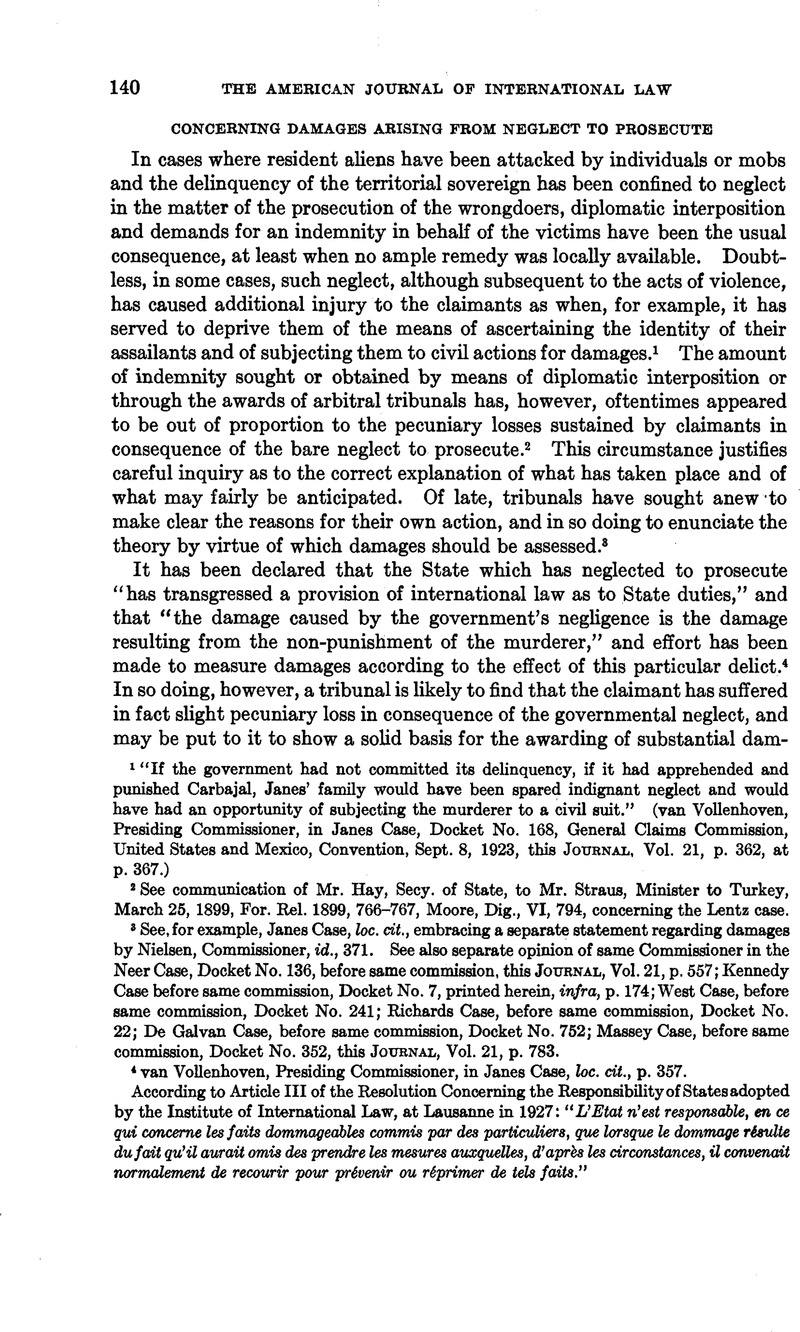Published online by Cambridge University Press: 04 May 2017

1 “ If the government had not committed its delinquency, if it had apprehended and punished Carbajal, Janes' family would have been spared indignant neglect and would have had an opportunity of subjecting the murderer to a civil suit.” ( Vollenhoven,van Presiding Commissioner, in Janes Case, Docket No. 168, General Claims Commission, United States and Mexico, Convention, Sept. 8, 1923, this Journal , Vol. 21, p. 362, at p. 367.)
2 See communication of Mr. Hay, Secy, of State, to Mr. Straus, Minister to Turkey, March 25, 1899, For. Rel. 1899, 766-766, Moore, Dig., VI, 794, concerning the Lentz case.
3 See, for example, Janes Case, loc. cit., embracing a separate statement regarding damages by Nielsen,Commissioner, id., 371. See also separate opinion of same Commissioner in the Neer Case, Docket No. 136, before same commission, this Journal , Vol. 21, p. 557; Kennedy Case before same commission, Docket No. 7, printed herein, infra, p. 174; West Case, before same commission, Docket No. 241; Richards Case, before same commission, Docket No. 22; De Galvan Case, before same commission, Docket No. 752; Massey Case, before same commission, Docket No. 352, this Journal , Vol. 21, p.783.
4 Vollenhoven, van Presiding Commissioner, in Janes Case, he. dt., p. 357 Google Scholar. According to Article III of the Resolution Concerning the Responsibility of States adopted by the Institute of International Law, at Lausanne in 1927: “ L'Etat n'est responsible, m ce qui conceme les faits dommageables commis par des particuliers, que lorsque le dommage risulie dufait qu'il await omis des prendre les mesures auxquelles, d'apres les circonstances, U convenait normalement de recourir pour privenir ou réprimer de tela faits.”
5 Thus in the Janes Case, the Presiding Commissioner declared: “ Not only the individual grief of the claimants should be taken into account, but a reasonable and substantial redress should be made for the mistrust and lack of safety, resulting from the government's attitude.” (This Journal, p. 370.)
6 States are unlikely to agree to confer jurisdiction upon a claims commission to award punitive damages for the benefit of a national of either contracting party. Parker, Umpire of the Mixed Claims Commission, United States and Germany, declared in his opinion in the Lusitania cases, November 1, 1923: “ The industry of counsel has failed to point us to any money award by an international arbitral tribunal where exemplary, punitive, or vindictive damages have been assessed against one sovereign nation in favor of another presenting a claim in behalf of its nationals.” (Consolidated Edition of Decisions and Opinions, 1925, 17, 27.) It is believed that in awarding substantial damages on the theory mentioned above in the text the claims commission may in reality fulfill a “ punitive mission.”
7 “ It is clear that arbitral tribunals in assessing damages for the failure of authorities to punish wrongdoers have taken account of the damage caused by the wrongful acts of the culprits for which governments have been held responsible.” (Nielsen, American Commissioner, in the Janes Case, this Journal , Vol. 21, p. 374). See Davy Case, Ralston's Report, 410, 412. Cf. Borchard,Edwin M. in this Journal , Vol. 21, pp. 516, 517.
8 See, for example, Cotesworth and Powell Case, Moore, Arbitrations, II, 2050, 2082, 2085; Opinion of Little, Commissioner, in Case of Amelia de Brissot, id., III, 2967; Opinion of Findlay, Commissioner, in same case, id., 2969.
9 Separate statement of Nielsen, American Commissioner, in Janes Case, this Journal , Vol. 21, p. 371 at p. 373.
10 In the Poggioli Case, Ralston's Report, 847, 869, complicity was deemed to exist. “The rule of the law of nations is that the Government which refuses to repair the damage committed by its citizens or subjects,to punish the guilty parties or to give them up for that purpose, may be regarded as virtually a sharer in the injury and as responsible therefor.” Mr. Fish, Secy, of State, to Mr. Foster, Minister to Mexico, No. 21, Aug. 15, 1873, MS. Inst. Mex. XIX, 18, citing Calvo, Droit Int., II, 397, Moore,Dig., VI, 655.
11 The law rather than the court penalizes the delinquent State. The function of the tribunal is to determine primarily whether the particular State charged with neglect to prosecute has failed to fulfill its international obligation. If convinced that the State has so failed, the tribunal, guided by what it understands to be the law of nations with respect to responsibility, makes enunciation ofthe penalty that that law prescribes,and thereupon proceeds to ascertain what in fact are the damages resulting from the actsfor whichthe State is deemed liable. The damages awarded are essentially compensatory for the loss occasioned by those acts.